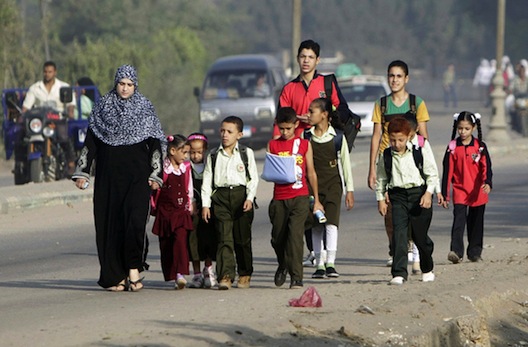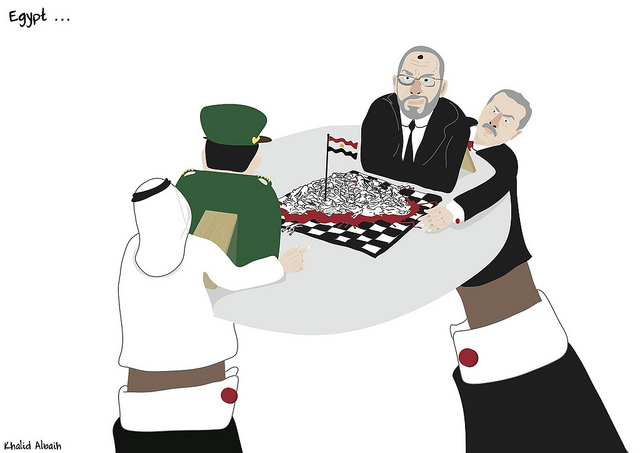 Catch up on the latest out of Egypt every week, with analysis, news updates, photos, videos, and more.
Catch up on the latest out of Egypt every week, with analysis, news updates, photos, videos, and more.
Quote of the Week
-Younis Makhioun, Head of the Salafi Nour Party | Ahram Online
- Army will not nominate candidate for Egypt’s presidency: Spokesman
- Egypt court bans Muslim Brotherhood group
- Roadside bomb wounds two soldiers in Egypt’s Sinai as security operation continues
- Dissolving Brotherhood illegitimate but will not hinder national reconciliation: FJP leader
- Campaign to issue new constitution gathers different momentum
- Egypt police raid Islamist stronghold near Cairo
- Egypt government postpones dissolution of Brotherhood
- August sectarian attacks largest in Egypt history: NGO
- Security forces shuts headquarters of Freedom and Justice Party newspaper
- Egypt minister says relations with United States unsettled
- Amended law allows Egypt courts to extend defendants’ detention indefinitely
- Committee disagrees over military trials; Nour Party rejects drafting of new constitution
- Egyptian presidential adviser says Brotherhood reconciliation still possible
- Pro-Morsi rallies continue as Islamist alliance calls for week-long protests
- Egyptian and Ethiopian FMs discuss common interests: Spokesman
Egyptian Christians struggle to overcome minority status | Dina Ezzat, Aswat Masriya
Dina Ezzat writes on the continued struggle of Egyptian Christians’ status in Egypt both in society and in government. She introduces her piece by briefly introducing a new film to be released in January 2014 by Amr Salama.
“The film [Excuse My French (Lamowakhza)] tells the story of Hany Abdallah, an Egyptian school boy who makes the decision to hide his Christian faith and pretend to be part of the Muslim majority.”
“Amr Ezzat, of the Egyptian Initiative for Personal Rights, argues that up until the constitution of 2012, the status of Copts was more or less in accordance with the concepts of the Ottoman rule, despite the language of equal citizenship here and there.”
“Today, the representation of Copts in the 50-member committee is almost exclusively limited to representatives of churches, who had walked out on the previous drafting committee to protest what they found to be discrimination.”
Who is Egypt’s next president? | Bassem Sabry, Al-Monitor
As the transition period in Egypt continues, names are starting to float among the public; names of potential presidential candidates. Bassem Sabry, although recognizing the fluidity of the current situation and its ever changing politics, survey’s the environment.
“A heated wave of nationalism is taking over the country, with the military and Sisi at its heart..Most of the Brotherhood’s top leadership is now in official custody pending investigations and trials, leaving the country’s largest political force effectively decapitated and ostensibly less capable of pushing for any potential candidate in such elections.”
“The influence of Egypt’s deep state and security apparatuses seems to be on the rise once more. If everything stays the same, the candidate who is more likely to win such presidential elections would be the candidate who has (or at least appears to have) the backing of Sisi and the military.“
Sabry discusses briefly some of the well-known political figures who are less likely to run including Mohamed ElBaradei, Amr Moussa, and Abdel Moneim Aboul Foutouh. However, among those who ran in the last elections, a few may still have a shot at presidency; Ahmed Shafik and Hamdeen Sabahi. Sabry goes on to discuss the names of figures who did not run in the last elections including Sami Anan, Mourad Mowafi, and Mostafa Hegazy.
“Again, over the next few months, so much could happen in Egypt, least of which could be the roadmap amending schedule. Obviously, new faces could suddenly appear on the scene as well and carve a space for themselves as potential candidates. But while it is not necessarily taboo for a military man to don civilian clothing and run for office, Egypt would benefit the most from having a civilian leader helm the country, and help it move a step closer to becoming a true civilian democracy.”
Prayer of Fear, poem by Mahmoud Ezzat
Portrait of Naguib Mahfouz courtesy of Adam Makary

Cartoon by Khalid Albaih
September 28,1970 Gamal Abdel-Nasser died of a heart attack following the close of the extraordinary 1970 Arab League Summit. On September 27, Nasser facilitated the temporary cease-fire between the Palestinian Liberation Organization and the Jordan’s King in an effort to quell the civil war between PLO forces in Jordan and the Trans-Jordanians led by Jordan’s Armed Forces.
Despite the controversial views on Nasser both within Egypt and beyond its borders, he is still revered as the Ahram Online published an article discussing the lasting effect Nasser has had on Egyptians, appropriately called, Gamal Abdel-Nasser, the man who never died.
“Ruling Egypt from 1954 until his death in 1970, Nasser remains a symbol of dignity, pan-Arabism, and above all social justice for many. He lingers in the consciousness of those who still dream of fulfilling the hopes of the late president.”
Reactions to the banning of the Muslim Brotherhood

MB decision should act to enhance discussion on need for transparent civil society & reforming of NGO governing/registration, not hinder it
— Hafsa Halawa (@HafsaHalawa) September 23, 2013
#Egypt‘s banning of Muslim Brotherhood won’t make its enormous support disappear. Political participation inevitable. http://t.co/xTt41g2lZd
— Kenneth Roth (@KenRoth) September 23, 2013
Of course now that the court disbanded #MB they will disappear, along with their ideas and their followers will be ‘good’ people #stupid
— Mohammed Yahia (@MohammedY) September 23, 2013
Even if FJP remains legal, MB will go underground and then who knows what… #Egypt
— Steven A. Cook (@stevenacook) September 23, 2013
Reactions to the drafting of the new constitution
The drafting of the constitution has been the focus of discussion and debate, giving rise to close tracking of the process as well as new campaigns and calls for reform. One campaign that has been a huge focus on twitter and other forms of social media has been the call to ban military trials of civilians in the new constitution. One blog was published with a discussion and overview of how other constitutions around the world treat military trials for civilians. Follow the hashtag #NoMilTrials or #BanMilTrials.
#MB always blamed 2012 #Egypt constitution on Salafi pressure. Salafi participation in this version will be an interesting answer to that.
— salamamoussa (@salamamoussa) September 22, 2013
The way some talk abt religion in the constitution makes it sound like Shias are waiting for the right constitutional loophole to take over.
— Basil الضبع (@basildabh) September 23, 2013
Image: Photo: Children returning to school in Egypt (Flickr users pds209)
